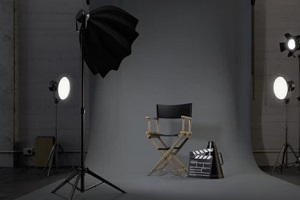 No matter their niche, businesses are wise to carry insurance that protects them from liability and loss from the risks unique to their industry. Film production is no exception, but selecting the right one for your production company can feel confusing with various policy types.
No matter their niche, businesses are wise to carry insurance that protects them from liability and loss from the risks unique to their industry. Film production is no exception, but selecting the right one for your production company can feel confusing with various policy types.
What’s the difference between entertainment insurance and short-term production coverage? What does DICE even stand for? These questions can leave you hesitant to invest in a policy because you’re not sure what is best.
Many film production companies require DICE coverage for their shoots. DICE creates financial buffers if something unexpected happens in production. It usually covers some costly pieces of equipment like soundscapes or lighting necessary during shooting: insuring against theft, damage, and unexpected loss associated with the event happening during filming.
At the same time, this type of protection goes well beyond those basics– it also works to find ways to cut costs involving human labor safety, such as actor wardrobe failures, strike clauses, or union-approved accommodations– all within budgetary considerations that limit ties with producers and their bottom line.
This might be considered a unique style of detailed care that tends to separate this special niche of insurance from other industries looking to maximize safety on the job
What Is a DICE Policy?
A DICE policy is one of the most common variants in the film industry. DICE stands for Documentaries, Industrial, Commercial, and Educational. In other words, almost all productions that don’t qualify as TV shows or feature films fall within the umbrella of DICE and can benefit from such an insurance policy.
A DICE policy is meant to cover multiple projects within a year (hence the typical exclusion of feature films, which often take multiple years to create). Of course, other types of insurance also cover multiple annual projects, so DICE is one of many options. To pick the right insurance for your production company, you’ll need to understand how DICE works and how other options compare.
DICE vs. Short-Term Production Insurance
DICE covers multiple projects each year—but so does short-term production insurance. The difference is that you will need to purchase a separate short-term insurance policy for each production your studio works on if you opt for short-term production insurance. The costs can add up quickly since you’re taking out multiple individual policies.
In contrast, DICE provides your production company with one policy for all your annual projects. This is why DICE is sometimes used interchangeably with annual production insurance. Having just one policy means you don’t have to go through the hassle of securing new coverage for each project, and your costs are lower.
Think of how expensive it is to have two separate car insurance policies instead of bundling two drivers onto a single policy; that’s the same mechanism that saves you money with DICE.
What Is Covered Under a DICE Annual Production Insurance Policy
A DICE annual production insurance policy covers the essentials for a film production studio. These include issues such as:
- Property damage: both in terms of damage to locations caused by shoots and effects as well as damage and loss to items used during filming
- Vehicle damage: can cover vehicles used for filming as well as those used off-set for errands and other tasks
- Recording damage: if your recording media themselves are damaged, you could fail to meet deadlines or need to invest in costly reshoots that DICE could cover
- General liability: protection in case someone is injured on set
- Errors and omissions: shields production companies from liability for many media-related challenges like accidental copyright infringement
These are just a few of the many potential coverages that a DICE policy can provide. Some will be even more robust, and others might leave out specific areas to reduce the overall cost. Be sure to do your research about any policy you’re considering so that you know what’s covered.
Common Exclusions
While a DICE annual production insurance policy can cover everything your production studio is working on in an entire year, each project might have unique hazards that require additional insurance.
For example, DICE does not usually cover unique shoots, like filming underwater or in hazardous areas. Many stunts and animal cooperation types are only allowed if you pursue a specific rider to add them on.
If you are working with an A-list celebrity, you might need to secure additional coverage to ensure your insurance can compensate for their value. Using weapons and pyrotechnics can sometimes be excluded depending on the policy.
Get Comprehensive DICE Insurance from a Reputable Film Insurer
Choosing the right insurance for your film production studio is one of your most important decisions. Failure to have proper coverage can leave you on the hook for thousands or even millions of dollars in damages and losses.
The experts at MFE Insurance have helped film agencies to choose the right coverage for all their needs, including DICE policies where applicable. Reach out to learn more about the types of insurance we offer, or schedule an appointment to review your options.
